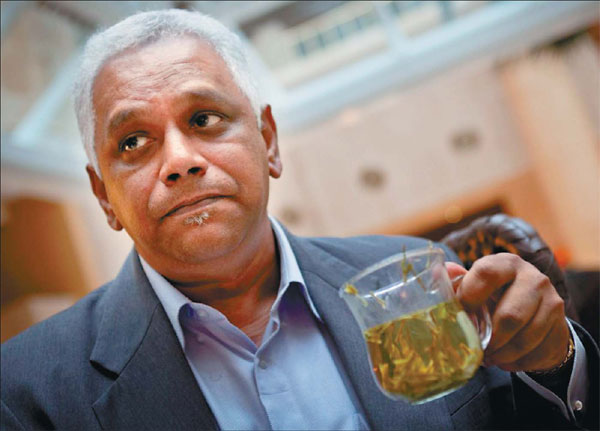China asked to help in African mining
|
Subramaniam Ragubathi, owner of Nambib Resources Pty Ltd, said he believes a partnership with China for the exploration of resources on the leased areas will be mutually beneficial. Kuang Linhua / China Daily |
'Huge deposits' of rare earths, precious metals, company claims
The exploration rights owner of newly found world-class diamond, rare earth and strategic minerals deposits in the Southwestern African nation of Namibia is seeking support from China and partnership with Chinese companies for cooperative development of the resources.
Malaysian businessman Subramaniam Ragubathi, owner of Nambib Resources Pty Ltd, a diamond and minerals exploration company registered in Namibia, discovered the huge diamond and mineral resources.
Considering China's strong presence in Africa and its expertise in mining and refining of rare-earth metals, Ragubathi says he believes a partnership with China for the exploration of resources on the leased areas will be mutually beneficial.
The leases along the Skeleton Coast cover about 2,300 square kilometers.
The area is estimated to have 700 to 800 million metric tons of rare-earth ore, which can supply the global demand of 130,000 tons a year for at least 30 years, according to Nambib Resources.
In one of the four leases, Toscanini, the company has identified 57 million carats of diamonds with a government-appraised value of more than $20 billion.
The company also owns the mining license of the Toscanini mine.
Ragubathi says his company is in talks with several Chinese State-owned companies about cooperation but declined to release their names.
Sources from two large State-owned resources companies, Baotou Steel Rare-earth Hi-tech Co, the largest rare-earth producer in the country, and China Minmetals Corp, a major metals and mineral trader, says they are unaware of any cooperation so far.
Zhang Zhong, general manager of Baotou Steel Rare-earth, says it would be good for the company to invest in African rare-earth mines so long as the resources are of high quality.
An anonymous source with China Minmetals says although the company has businesses in 15 countries, Namibia is not one of them.
So far, China Minmetals has copper, iron ore and alumina businesses in African countries including the Democratic Republic of Congo, Mauritania and Jamaica.
The monazite, an ore with rare-earth elements, on the Skeleton Coast of western Namibia, was found to be of higher quality than the monazite in many other areas because of its unique geological condition, says Ragubathi.
He feels that the support of the Malaysian and Namibian governments as well as the support and participation of China is crucial.
"I need technology, technical support and specialized equipment that China can provide," he says.
China is the largest rare-earth user and producer in the world. It has a proven reserve of about 18.59 million metric tons, accounting for about 23 percent of the known global reserve and supplying up to 95 percent of world demand.
Rare earths, a group of 17 elements, are essential in the manufacture of an array of high-tech products. They are becoming increasingly important in electronic devices used in the defense, alternative energy and communications industries.
At present, the United States and Japan are the two top importers of China's rare-earth resources. More than 60 percent of Japan's imports of these resources come from China.
In addition to the strategic resource, Ragubathi says there are potentially reserves of gold, platinum and uranium in the four leases, which require further geological study.
They have uncovered and mined thousands of carats of diamonds as well as identified about 57 million carats of diamonds in less than 10 percent of the 85,000 hectares covered by just one of the four leases, Toscanini.
"The deposit of diamonds within the Toscanini lease is considered to be one of the biggest deposits of diamonds in history, if not the biggest. It is an alluvial deposit with 95 to 98 percent gem quality, which places the diamonds among the best quality in the world," says Ragubathi.
Since 2009, China has been the second-largest diamond buyer in the world after the US.
As Western traditions are widely accepted, buying diamonds to celebrate weddings is becoming more popular in China.
The Shanghai Diamond Exchange became the fourth-largest diamond exchange in the world in 2011 with a total trading value of $4.7 billion.
dujuan@chinadaily.com.cn
(China Daily Africa Weekly 08/23/2013 page21)



















